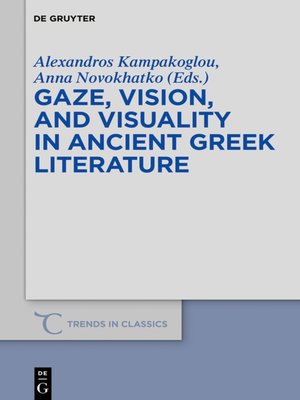Gaze, Vision, and Visuality in Ancient Greek Literature
ebook ∣ Trends in Classics--Supplementary Volumes
By Alexandros Kampakoglou

Sign up to save your library
With an OverDrive account, you can save your favorite libraries for at-a-glance information about availability. Find out more about OverDrive accounts.
Find this title in Libby, the library reading app by OverDrive.



Search for a digital library with this title
Title found at these libraries:
| Library Name | Distance |
|---|---|
| Loading... |
Visual culture, performance and spectacle lay at the heart of all aspects of ancient Greek daily routine, such as court and assembly, cult and ritual, and art and culture. Seeing was considered the most secure means of obtaining knowledge, with many citing the etymological connection between 'seeing' and 'knowing' in ancient Greek as evidence for this. Seeing was also however often associated with mere appearances, false perception and deception. Gazing and visuality in the ancient Greek world have had a central place in the scholarship for some time now, enjoying an abundance of pertinent discussions and bibliography. If this book differs from the previous publications, it is in its emphasis on diverse genres: the concepts 'gaze', 'vision' and 'visuality' are considered across different Greek genres and media. The recipients of ancient Greek literature (both oral and written) were encouraged to perceive the narrated scenes as spectacles and to 'follow the gaze' of the characters in the narrative. By setting a broad time span, the evolution of visual culture in Greece is tracked, while also addressing broader topics such as theories of vision, the prominence of visuality in specific time periods, and the position of visuality in a hierarchisation of the senses.






